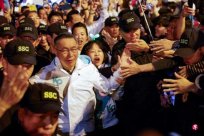
Mainland China and senior US officials held a dialogue before the Taiwan election. Liu Jianchao, Minister of the CPC Central Committee, held talks with the chief assistant deputy assistant assistant of the US President's National Security Affairs, to explain the position of mainland China and South China.Fenner emphasizes the importance of maintaining peace and stability in the Taiwan Strait and the South China Sea.
The United States media quoted senior US officials on the same day that the United States plans to send senior delegations to visit Taiwan after the election of Taiwan.
Liu Jianchao, who visited the United States, met with Fenner on Wednesday (January 10) on Wednesday (January 10).According to a press release issued by the White House, the two sides discussed the "frank and constructive" discussion on the basis of the San Francisco meeting in San Francisco last November last year.
The press release issued by the official website of the Ministry of the United States stated that the two sides believe that the two parties should continue to work together to promote the implementation of important consensus and achievements reached by the two heads of state, and continue to maintain communication and cooperation.The two sides also exchanged opinions on bilateral relations and international regional issues. Liu Jianchao explained the position of mainland China and the South China Sea.
Taiwan will hold a presidential election on Saturday (13th).Many analysts believe that Liu Jianchao visited the United States less than a week before the Taiwan election In order to strengthen the risk control of China and the United States in Taiwan after the selection.
China-US officials also have intensive contact in the field of military and economy this week.A meeting of the Ministry of Defense of the Chinese and American Defense on Monday to Tonasia, and Wang Wentao, Minister of Commerce Mainland Business, and US Secretary of Commerce Raymond Doro also called on Thursday.
Fenner and Liu Jianchao discussed global and regional security issues, including challenges facing the Middle East, the Russian and Ukraine War, and cross -strait issues.
Fenner emphasizes the importance of maintaining the peace and stability of the Taiwan Strait and the South China Sea.The two sides also reiterated that the two countries support the continued development of high -level diplomatic interactions.
China and the United States have selected questions to confront the problem
Taiwan elections add uncertain factors to a slightly eased Sino -US relations. While the two countries start high -level interaction before the election, they also select the problem.
Reuters and Voice of the United States on Thursday (January 11) quoted senior US officials that The United States opposes any external forces intervention or influence Taiwan's upcoming presidential election and legislator election.
U.S. officials also revealed that the United States will send senior delegations to visit Taiwan after the election.It is reported that the US President Bynden will send Democratic former Deputy Secretary of State James Steinberg to lead this cross -party delegation with Republican national security adviser Stephen Hadley.
U.S. officials emphasized that there is no candidate in the United States. "No matter who is elected, we will maintain the existing policy of Taiwan, and the strong non -official relationship between the two parties will continue."
Mao Ning, a spokesman for the Ministry of Foreign Affairs of China, responded to relevant questions at a routine press conference on Thursday that the mainland has always resolutely opposed the official exchanges between the United States and Taiwan.She warned the United States that "it is not allowed to get involved in the election in Taiwan in any form" to avoid serious damage to the Sino -US relations and the Taiwan Strait.
In response to the United States' opposition to any interference in Taiwan's elections, Mao Ning said "strong dissatisfaction and resolute opposition" and criticized the United States to "openly say three or four in Taiwan elections."
Shi Yinhong, a professor at the School of International Relations of Renmin University of China, analyzed during an interview with Lianhe Morning Post that if the presidential candidate for the Taiwan Democratic Progressive Party was elected, the tensions on both sides of the strait would continue to worsen or even worsen;The almost comprehensive squeezing will decrease significantly and long -term; if the candidate for the people's party will be elected, the pressure on Taiwan will be relieved in the short term.
Shi Yin Hong believes that the military tension between China and the United States on the issue of Taiwan will continue to deteriorate or relieve accordingly according to the above situation.But regardless of the results of the election, "the military competition between Beijing and Washington will continue, or even further intensify, thinking that the war in Taiwan or other regions will be prepared."



